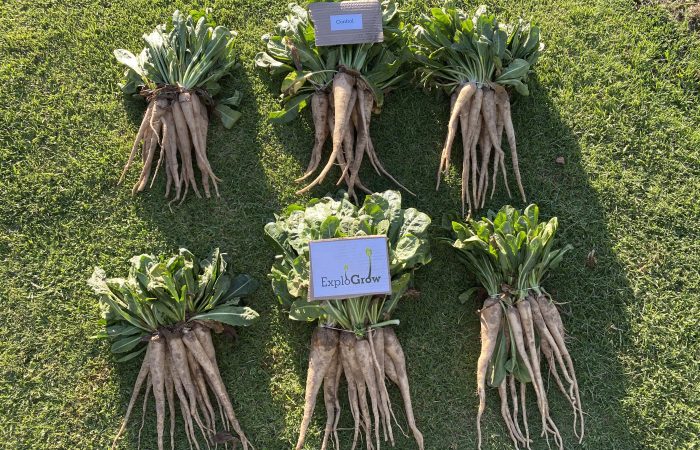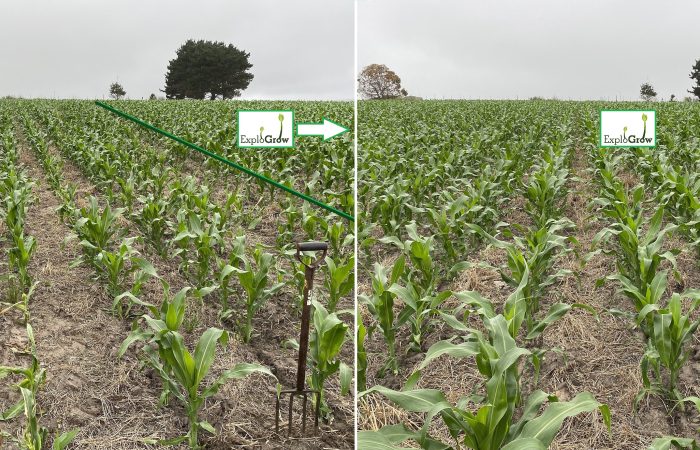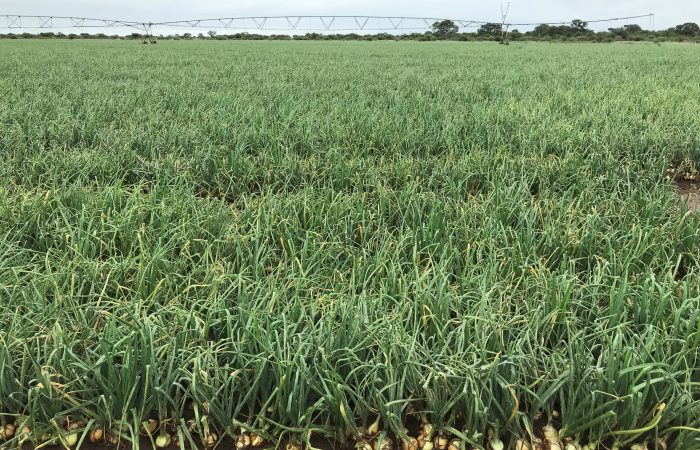Lucerne yield increased by 130% versus drought and pest damaged control
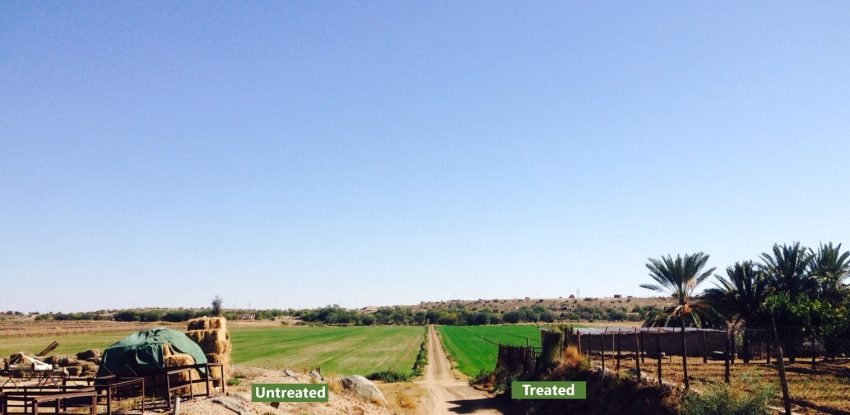
Growing Lucerne (Alfalfa) with ExploGrow™
Mr Francois van Rooyen, as specialist Lucerne and Pecan Nut agriculturist, carried out the following interesting controlled test on his Lucerne.
- The right-hand field was treated with ExploGrow™.
- The left-hand field was not treated.
- The soil is the same in both fields: very brackish and shallow water table, and is well drained with underground pipes.
- In all other respects the two fields were treated the same, except a variation in the type of Lucerne.
On the left hand field: Sardi 10 cultivar. On the right hand field WL 711. - Both fields were therefore top producers with low dormancy and both fields were also treated identically with organic acids, clay minerals, macro-elements, micro-elements and activated carbon, to provide an effective and balanced soil due to brackish conditions prevailing in the area.
"ExploGrow™ has just raised the maximum yield ceiling for my land and a 130% increase in yield represents a massive increase in profits."Mnr. Francois van Rooyen , Lusern en Pekanneute Landboukundige
UPDATE: Results after harvesting Lucerne
- Harvesting took place during March/April 2016
- Yield increase: 130%
- The ExploGrow™ treated area produced 23 tons per hectare versus 10 tons per hectare from the untreated area.
- Better plant health on the ExploGrow™ treated area showing a "remarkable difference compared to the untreated area".
- "After a severe and damaging drought, I would attribute the radically superior yields on the treated land to the bigger root systems, reduction in watering requirements and improved plant health, delivering over 23 tons per hectare compared with only 10 tons per hectare for untreated area." Mr van Rooyen
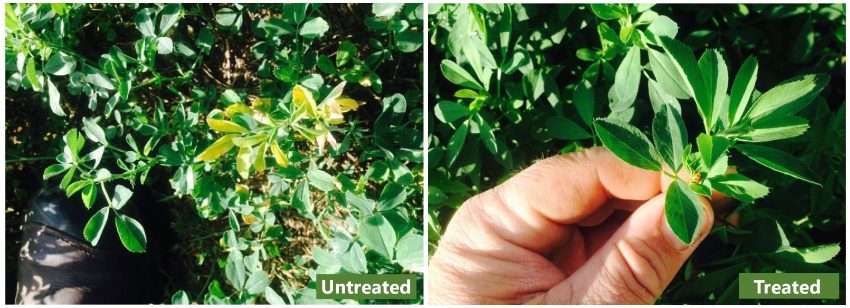
ExploGrow™ "...delivering over 23 tons per hectare compared with only 10 tons per hectare for untreated land."Mnr. Francois van Rooyen , Lusern en Pekanneute Landboukundige
Based on his expertise in balancing soil, Mr van Rooyen offers his analysis as follows:
"I believe that the carbon and organic acids act as excellent food for the ExploGrow™ microbes.
In nature, manure (for example) releases organic acids and then feeds organisms from the animal's intestines that generates diverse populations of ground microbes. Without the dung, the microbial populations would not develop, because some form of energy needs to drive the microbial activity. It is not enough to only use a balanced vitamin and mineral supplement. You also need protein, carbohydrates and other energy-rich compounds to function at the optimal level.
I therefore believe that the organic acids in my fields provide the energy to the microbes to develop a diverse strong population. This diverse population can now execute various tasks like (a) extracting minerals from the soil solution and (b) helping the plant to absorb the minerals.
Microbial activity fuels a high rate of multiplication. This impacts positively on the plants also acting as a precursor to the plant's own productions of hormones, resulting in stronger growth, like I observed with ExploGrow™.
The ExploGrow™ microbes develop a diverse population in symbiosis with the plant. This diverse group of microbes carry out several critical functions such as binding of atmospheric nitrogen, releasing phosphates etc. In this specific case of brackish soil, the microbes make the excess iron available to the plant for consumption, which would otherwise be detrimental to root establishment and growth.
I believe this is clear from the photo, when looking at the left-hand field. One can clearly see in the photo that on the untreated left field the plant microbial interaction is poor, although this field has an otherwise absolutely balanced fertilization program.
The soil in the left field is simply poor in essential microbes.
Looking at the right-hand field treated with ExploGrow™, the picture speaks for itself!"
“On my farm I noticed an extraordinary difference in the presence of lice (“Bladspringers”). The ExploGrow™ treated areas were virtually unaffected compared with the untreated areas that were severely affected. Furthermore, three other farmers that I supplied with ExploGrow™ experienced similar results.”Mnr. Francois van Rooyen , Lusern en Pekanneute Landboukundige
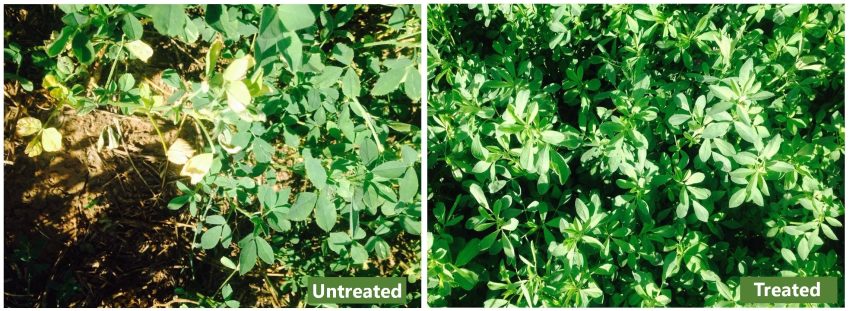
Photo: Note how many leaves there are on the treated plants compared to the low leaf count on the untreated plant.
At the end of the season Mr van Rooyen shared the following observations:
- "A very intense drought hit the central and western regions in South Africa.
- Insects such as Bladspringer (Leafhopper) that normally survive in the field, fed on Lucerne for the whole summer, causing severe damage.
- The ExploGrow™ treated area had a very positive effect on the resistance of the plants against insects.
- Where farmers applied ExploGrow in the spring, there was visible resistance. The population of the insects were much smaller on the ExploGrow treated areas. Also, there were far less marks on the leaves in the ExploGrow treated areas.
- Within six days of the end of March we had 150 mm of rain.
- The treated Lucerne survived much better in the wet conditions than the untreated Lucerne.
- In the end, production varied from 10 tons for the untreated Lucerne and 23 tons for the treated Lucerne."
"ExploGrow™ is a winner!"Mnr. Francois van Rooyen , Lusern en Pekanneute Landboukundige
Pecan Nuts
"I made the same observation on Pecan Nut trees, in an orchard where 40% of the trees were dying - although the soil was perfectly balanced with organic acids elements etc. After treatment with ExploGrow™ there was a total recovery"Mnr. Francois van Rooyen , Lusern en Pekanneute Landboukundige

